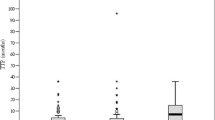Abstract
Purpose
To verify whether carriers of common single-nucleotide polymorphisms (SNPs) of the FSH receptor (FSHR) show reduced responsiveness of antral follicles to FSH administration as assessed by the FORT.
Methods
We performed a prospective study in a university hospital. Study population consisted of 124 Caucasian IVF-ET candidates. FSHR 307Ala and 680Ser variants were analyzed in haplotypes and as separated genes. Serum FSH, estradiol (E2), and anti-Müllerian hormone (AMH) were measured on cycle-day 3. Antral follicle (3–8 mm) count (AFC) and preovulatory follicle (16–22 mm) count (PFC) were performed, respectively, at the achievement of pituitary suppression (before FSH administration) and on the day of hCG administration. Antral follicle responsiveness to FSH administration assessed by the FORT (PFCx100/AFC).
Results
Data concerning baseline and IVF-ET parameters were similar between SNPs carriers and controls. Moreover, FORT was similar for different haplotypes Thr307-Asn680 (45.9%) and Ala307-Ser680 (39.4%) and 307Thr/Ala-Ala/Ala (41.1%; 5.0–91.6%) versus 307Thr/Thr (44.4%; 17.3–83.3%) and in 680Asn/Ser-Ser/Ser (40.0%; 5.0–91.6%) versus 680Asn/Asn (42.2%; 8.3–90.0%) carriers.
Conclusions
Antral follicle responsiveness to FSH, as far as measured by the FORT, is not influenced by the presence of SNPs of FSHR 307Ala and 680Ser.

Similar content being viewed by others
References
Aittomaki K, Lucena JL, Pakarinen P, Sistonen P, Tapanainen J, Gromoll J, et al. Mutation in the follicle-stimulating hormone receptor gene causes hereditary hypergonadotropic ovarian failure. Cell. 1995;82(6):959–68.
Behre HM, Greb RR, Mempel A, Sonntag B, Kiesel L, Kaltwasser P, et al. Significance of a common single nucleotide polymorphism in exon 10 of the follicle-stimulating hormone (FSH) receptor gene for the ovarian response to FSH: a pharmacogenetic approach to controlled ovarian hyperstimulation. Pharmacogenet Genomics. 2005;15(7):451–6.
Daelemans C, Smits G, de Maertelaer V, Costagliola S, Englert Y, Vassart G, et al. Prediction of severity of symptoms in iatrogenic ovarian hyperstimulation syndrome by follicle-stimulating hormone receptor Ser680Asn polymorphism. J Clin Endocrinol Metab. 2004;89(12):6310–5. doi:10.1210/jc.2004-1044.
de Castro F, Ruiz R, Montoro L, Perez-Hernandez D, Sanchez-Casas Padilla E, Real LM, et al. Role of follicle-stimulating hormone receptor Ser680Asn polymorphism in the efficacy of follicle-stimulating hormone. Fertil Steril. 2003;80(3):571–6.
Fanchin R, Schonauer LM, Cunha-Filho JS, Mendez Lozano DH, Frydman R. Coordination of antral follicle growth: basis for innovative concepts of controlled ovarian hyperstimulation. Semin Reprod Med. 2005;23(4):354–62. doi:10.1055/s-2005-923393.
Genro VK, Grynberg M, Scheffer JB, Roux I, Frydman R, Fanchin R. Serum anti-Mullerian hormone levels are negatively related to Follicular Output RaTe (FORT) in normo-cycling women undergoing controlled ovarian hyperstimulation. Hum Reprod. 2011;26(3):671–7. doi:10.1093/humrep/deq361.
Greb RR, Grieshaber K, Gromoll J, Sonntag B, Nieschlag E, Kiesel L, et al. A common single nucleotide polymorphism in exon 10 of the human follicle stimulating hormone receptor is a major determinant of length and hormonal dynamics of the menstrual cycle. J Clin Endocrinol Metab. 2005;90(8):4866–72. doi:10.1210/jc.2004-2268.
Hendriks DJ, Mol BW, Bancsi LF, Te Velde ER, Broekmans FJ. Antral follicle count in the prediction of poor ovarian response and pregnancy after in vitro fertilization: a meta-analysis and comparison with basal follicle-stimulating hormone level. Fertil Steril. 2005;83(2):291–301. doi:10.1016/j.fertnstert.2004.10.011.
Klinkert ER, te Velde ER, Weima S, van Zandvoort PM, Hanssen RG, Nilsson PR, et al. FSH receptor genotype is associated with pregnancy but not with ovarian response in IVF. Reprod Biomed Online. 2006;13(5):687–95.
Little J, Higgins JP, Ioannidis JP, Moher D, Gagnon F, von Elm E, et al. Strengthening the reporting of genetic association studies (STREGA): an extension of the strengthening the reporting of observational studies in epidemiology (STROBE) statement. J Clin Epidemiol. 2009;62(6):597–608. doi:10.1016/j.jclinepi.2008.12.004. e594.
Overbeek A, Kuijper EA, Hendriks ML, Blankenstein MA, Ketel IJ, Twisk JW, et al. Clomiphene citrate resistance in relation to follicle-stimulating hormone receptor Ser680Ser-polymorphism in polycystic ovary syndrome. Hum Reprod. 2009;24(8):2007–13. doi:10.1093/humrep/dep114.
Perez Mayorga M, Gromoll J, Behre HM, Gassner C, Nieschlag E, Simoni M. Ovarian response to follicle-stimulating hormone (FSH) stimulation depends on the FSH receptor genotype. J Clin Endocrinol Metab. 2000;85(9):3365–9.
Rodini GP, Genro VK, Matte U, Pereira FS, Bilibio JP, Greggianin C, et al. There is no complete linkage between the polymorphisms N680S and T307A of the follicular stimulating hormone receptor gene in fertile women. J Assist Reprod Genet. 2011;28(3):221–4. doi:10.1007/s10815-010-9503-7.
Simoni M, Gromoll J, Hoppner W, Kamischke A, Krafft T, Stahle D, et al. Mutational analysis of the follicle-stimulating hormone (FSH) receptor in normal and infertile men: identification and characterization of two discrete FSH receptor isoforms. J Clin Endocrinol Metab. 1999;84(2):751–5.
Sudo S, Kudo M, Wada S, Sato O, Hsueh AJ, Fujimoto S. Genetic and functional analyses of polymorphisms in the human FSH receptor gene. Mol Hum Reprod. 2002;8(10):893–9.
Financial support
This study was supported by a scholarship from the CNPq (Conselho Nacional de Desenvolvimento Científico e Tecnológico) and a grant from the Fundo de Incentivo a Pesquisa (FIPE) of Hospital de Clínicas de Porto Alegre—RS—Brazil.
Author information
Authors and Affiliations
Corresponding author
Additional information
Capsule
FSH receptor genotype does not influence antral follicle responsiveness to exogenous gonadotropin as far as measured by FORT.
Rights and permissions
About this article
Cite this article
Genro, V.K., Matte, U., De Conto, E. et al. Frequent polymorphisms of FSH receptor do not influence antral follicle responsiveness to follicle-stimulating hormone administration as assessed by the Follicular Output RaTe (FORT). J Assist Reprod Genet 29, 657–663 (2012). https://doi.org/10.1007/s10815-012-9761-7
Received:
Accepted:
Published:
Issue Date:
DOI: https://doi.org/10.1007/s10815-012-9761-7




